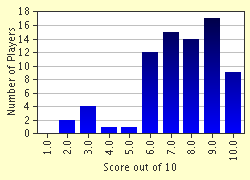Quiz Answer Key and Fun Facts
1. Who is the author of "In Flanders Fields"?
2. The author was in which country's army?
3. During which war was the poem written?
4. Where is Flanders?
5. What flower, prevalent in Flanders (and mentioned in the poem) has become a symbol of remembrance and honouring of the war dead?
6. There are birds mentioned in the poem who continue to bravely sing, despite the sounds of the guns below. What species of bird is mentioned?
7. This poem is written in the "voice" of a certain type of soldier. What type of soldier?
8. True or false: The last words of the poem are "In Flanders Fields".
9. When did World War I end?
10. True or false: The author's last words were a quote from this poem.
Source: Author
beavisbeatle
This quiz was reviewed by FunTrivia editor
bullymom before going online.
Any errors found in FunTrivia content are routinely corrected through our feedback system.


